
South of the Mason-Dixon Line
There is no singular “American” culture. Instead, it’s a patchwork of different histories, traditions, and dialects—a culmination of the experiences of those who live in the area. Language is an important aspect of regional identity and culture, and the South is no exception. Whether you’re new to the area or interested in learning about the origins of popular expressions, here are southern words and phrases you should know. Say these 9 words and we’ll tell you where you grew up.
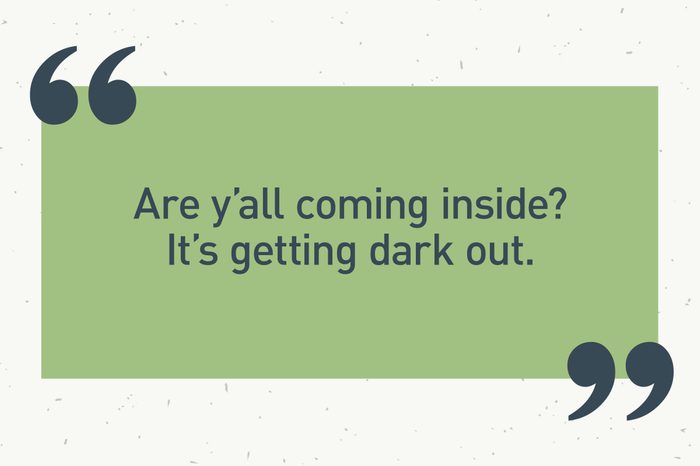
It’s gender-inclusive
If you asked someone from outside the South—or outside of the United States—to name one Southern word, chances are they’ll go for “y’all.” Yes, it’s a combination of the words “you all,” but it’s more than that, and there’s no universally agreed-upon origin story. Some theorize that it dates back to the plural form of “you” found in Old English. Another possible explanation is that it descends from the Scots-Irish “ye aw” rather than “you all.”

The poor dear
Some Southern expressions are actually thinly veiled burns, the most famous being “bless your heart.” Though it sounds like a compliment, it’s really a way of questioning another person’s intelligence or common sense under the guise of sounding polite. However, it can also actually be as polite and kind as it sounds. “It’s an expression that has a couple of different implications that go with it,” Kirk Hazen, a linguistics professor at Western Virginia University and expert on American dialects, told MEL Magazine. “And it all is related to power. The power of who’s talking and who’s listening. I know it’s gotten really popular. In linguistics, we call that ‘enregistered.'”
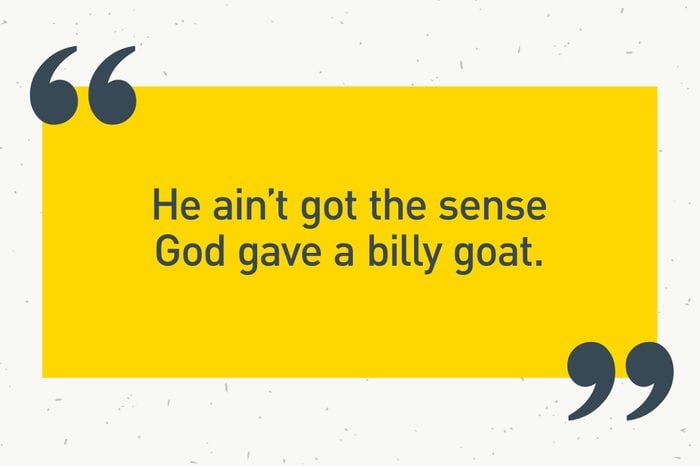
You’ve goat to be kidding
“One of my favorite Southern expressions is ‘ain’t got the sense God gave a billy goat,” Katie Moseman author of Fixin’ to Eat: Southern Cooking for the Southern at Heart tells Reader’s Digest. “I learned it from my mother, whose family comes from Georgia and South Carolina.” According to Moseman, it means someone who doesn’t have any common sense. Find out if you’re like the rest of us and mispronounce these common words,

A whole lot of legumes
If something doesn’t have much value, Southerners may say that it “doesn’t amount to a hill of beans.” One theory is that this phrase dates back to at least 1858 and originally referred to a literal pile of beans in a book on farming that described how to grow lima beans. In one scenario, the author indicated that if one bean was useless, then a whole hill of beans would be especially worthless. The phrase really sprouted when it was used at the end of the 1942 film Casablanca, when Humphrey Bogart says to Ingrid Bergman, “Ilsa, I’m no good at being noble, but it doesn’t take much to see that the problems of three little people don’t amount to a hill of beans in this crazy world.” Don’t miss these foods that are called by different names in certain parts of the country.

If it ain’t broke…
In the South, if you’re getting ready to do something, you may say that you’re “fixin’ to” do it. According to Southern Living, this means that you have every intention of doing something, but you may take your time doing it. The Yale Grammatical Diversity Project English in North America explains that this phrase is most common in the South Atlantic and the Gulf States, and is somehow related to the African American English phrase “finna”—which also refers to something that will happen in the future—though the exact connection is unclear.

When you need to know the full extent
In order to find out the full extent of something, some parts of the South use the construction “[wh-question word] all”—as in “what all,” “where all,” and “who all.” According to the Yale Grammatical Diversity Project English in North America, this phrases emphasize “the comprehensive scope” of the question, and is primarily found in the South and South Midland, including North Carolina and the Ozarks.
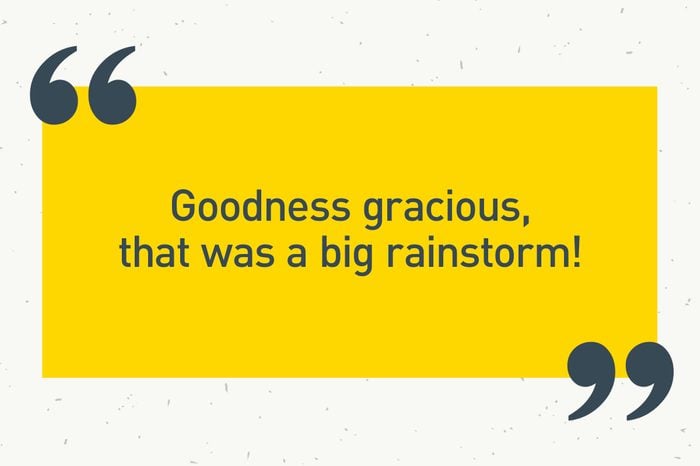
Great balls of fire
Though it started off as a Southern expression, saying “Goodness gracious!” when surprised, alarmed or dismayed has caught on throughout the United States. It dates back to the 1700s. Both “goodness” and “gracious” are colloquial expressions originally referring to the goodness and/or gracious of God, and were not considered vulgar or blasphemous.
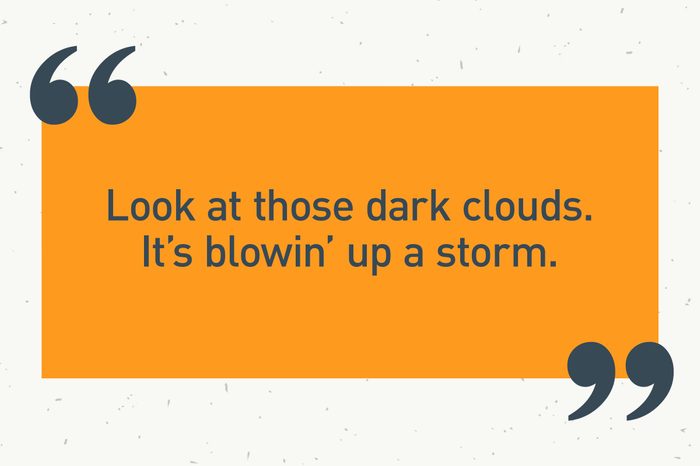
Grab your umbrella
Speaking of storms, sometimes you can see them coming. The sky gets dark, the wind picks up and dark, low clouds gather; in other words, “it’s blowin’ up a storm.” This means that a storm is imminent, Southern Living explains. Though the origins are unclear, the phrase makes sense when you think about it, given that when a storm is about to happen the wind tends to be strong. You can also predict the weather by the type of cloud in the sky.
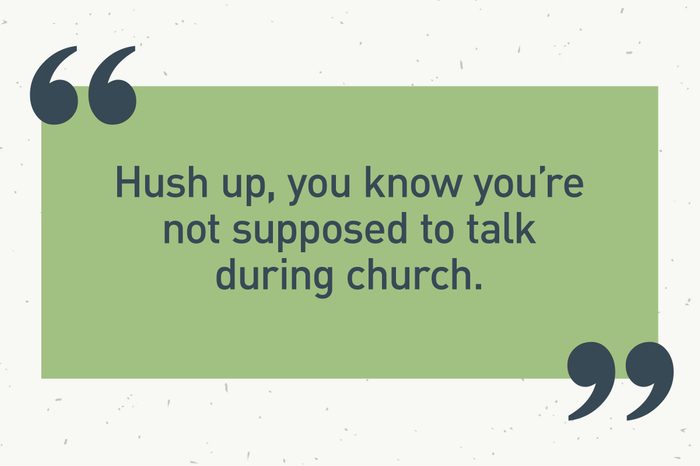
Pipe down
Instead of saying “shut up,” you will likely hear Southern mothers telling their kids to “hush up.” As Ronda Rich wrote in the Gainesville Times, saying “shut up” was considered rude and on-par with other “swear words,” so the softer “hush up” is used in its place. The word “hush” dates back to the Middle English word “hussht” which came from “huissht”—an interjection used to enjoin silence. It’s first known use was in 1546 and eventually, it made it to the South.

Enough for a whole pharmacy
To express having a huge amount of something a Southerner might say that someone has more of it “than Carter has pills.” This expression refers to a popular patent medicine created in 1868 called “Carter’s Little Liver Pills.” Apparently there were a lot of these pills because we may not remember the medicine but the phrase has stuck around.
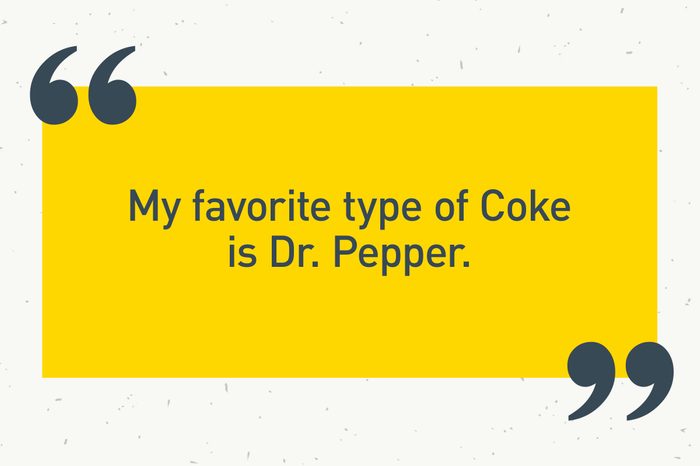
Thirsty?
One way to determine which part of the country someone is from is to ask them what they call a sweet carbonated beverage. Those in the Northeast usually say “soda,” while Midwesterners prefer “pop.” Southerners, on the other hand, tend to refer to any type of soft drink as “Coke.” So why is this the case? One theory is that because Coca Cola originated in the South—Atlanta to be specific — and was the first mass-marketed soft drink, the word caught on as a catch-all term and never went away. Speaking of, you’ll want to know the real difference between Coke and Pepsi.

Forget the map
Ask someone for directions in the South, and chances are they may refer to a place being “over yonder.” Usually accompanied by pointing in the general direction of the place, “yonder” tends to be at a distance, yet not too far — possibly within eyesight, according to Miriam Webster. Southern Living explains that “yonder” is a combination of the Dutch “ginder” (meaning “over there”) and the English word “yon.”

Glory, glory, hallelujah
Southerners have plenty of ways to express surprise, another example of which is “Well I’ll be John Brown,” sometimes also said as “Well I’ll be John Browned.” This expression refers to John Brown the abolitionist who tried to lead a slave rebellion in Harpers Ferry, West Virginia and later was hanged for it in 1859. According to one theory, the phrase was used to mean that someone’s involvement in something would lead to their hanging and/or imminent death. Over time this softened to simply mean that a person was—or felt—damned. Here are 16 other everyday phrases with surprisingly dark origins.

That’s Mr. Hill to you
Given their propensity for avoiding swearing, Southerns came up with other ways to express themselves. One example of this is “What in the Sam Hill…” which can be used in place of an expletive. Though the exact origin is murky, one possible explanation is that the real-life Sam Hill, a surveyor for the copper-mining industry, had a tendency to curse a lot. So, rather than curse themselves, people who submit Sam Hill’s name for the frowned-upon word. Find out 37 hilarious phrases parents will say to avoid cursing.
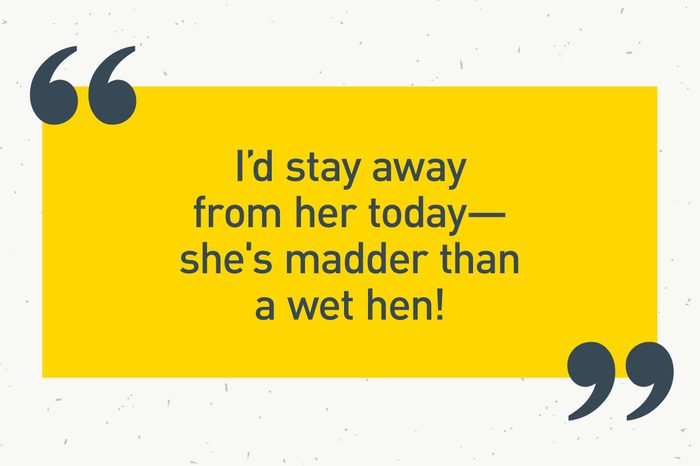
Stay away from this one
If someone is very angry, you might say that they are “madder than a wet hen.” According to one theory, this is because when hens would get flustered, Southern farmers would dunk them in cold water to try to get them to snap out of it, making it easier to collect their eggs.

Get moving
Along the same lines as “bless your heart,” telling someone to “take your own sweet time” sounds polite, but is often said sarcastically to comment on how slowly someone is moving. The origins of the phrase are unclear but fall under the category of softening language so as not to appear rude while managing to get your frustration across.

Only the choicest cuts
If someone is living “high on the hog,” it means that they are doing well for themselves and enjoy plenty of comforts and luxuries. One theory suggests that this expression refers to the upper part of a hog, which contains the best quality and most expensive cuts of meat—superior to others like the knuckles or hocks.

The bovine commute
When you want to say that something is probably going to take a long time—even all day—you can say that you’ll be doing it “’til the cows come home.” As Southern Living explains, cows aren’t known for being speedy and typically stay out wandering around until it’s time for them to be fed. In other words, doing something “’til the cows come home” usually means that it’s going to take all day—and possibly all night, too.

Watch your mouth
You’ve probably heard the exclamation “What in tarnation?!” but may not know its origins. Like many of the other words and phrases on this list, “tarnation” is used as a replacement for stronger words that were considered blasphemous or impolite. In this case, it’s a euphemism for “damnation”—as in, eternal damnation in hell—and likely dates back to the late 18th century. In fairness, that is something to get upset about.

Express yourself
If you want to say that you’d prefer not to do something, you may say that you “would rather” not do it. Alternatively, you could say “if I had my druthers” to express your preference to avoid something. So what in the world does “druthers” mean? According to one theory, the words “would rather” somehow morphed into “my druthers.” (Say it fast and you’ll see what we mean.) Actually, it started out as “my drathers,” which appeared in the United States towards the end of the 19th century and soon turned into “my druthers.” It was first recorded in a magazine in 1870. Find out the Southern belle etiquette we should bring back.
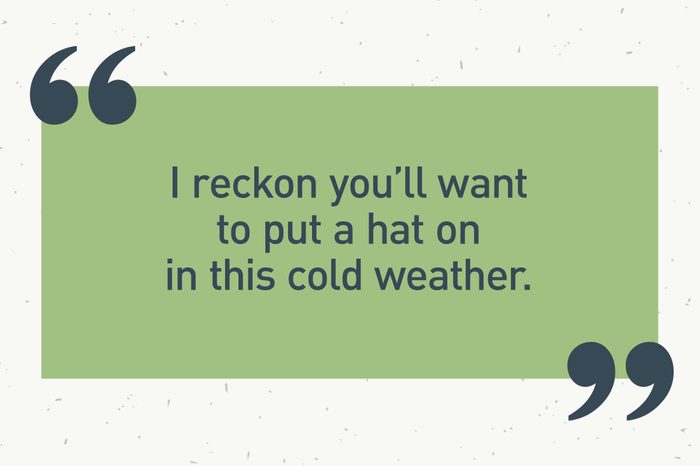
The reckoning
In the South, the phrase “I reckon” can be used in place of “I think” to express your opinion about something. The word “reckon” can be traced back to the Old English word “gerecenian” which means “to explain, relate, recount, arrange in order.” And saying “I reckon” dates back to the 1600s, when it was used regularly in literature. At some point, though, it fell out of use in other parts of the country and became associated with the South.

Time to bake something
If someone is moving very slow pace, you could say that they’re “slower than molasses in the winter.” The origin of this one is pretty straightforward: if you’ve ever tried to pour molasses out of a bottle in the cold, you’ll know that the thick liquid takes a long time to make its way out. Since molasses is a staple of Southern cooking, it makes sense that this phrase caught on and stuck around.

Mighty fine
When someone asks you how you’re doing and you want to indicate that you’re doing well, you could say that “I’m finer than frog hair split four ways.” Given that frogs are small and (most are) hairless, any hair they might have would be pretty thin (or “fine”), and splitting it four ways would make it even finer. Though the exact origin of this unusual phrase is unknown, one theory is that it was first used in C. Davis’ “Diary of 1865,” which read: “I have a better flow of spirits this morning, and, in fact, feel as fine as frog’s hair, as Potso used to say.”
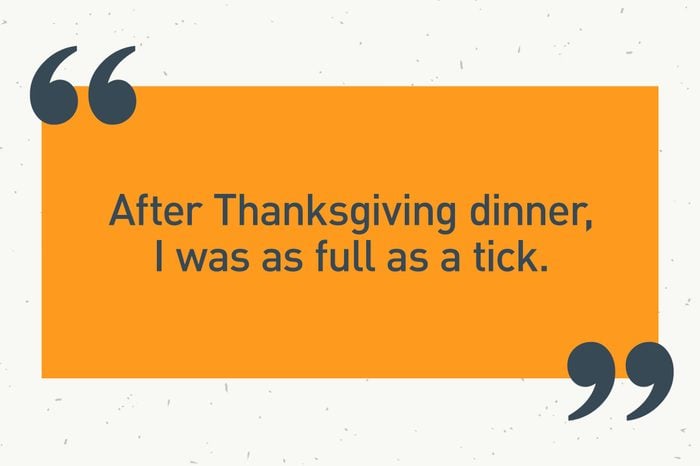
Get out the spray
Prepare yourself: this one is pretty vivid. After someone has eaten a large meal—to the point of excess—they may say that they are as “full as a tick.” If you know anything about ticks, it’s probably that they feed on blood and can become quite engorged after doing so. Despite being an unpleasant image, this expression has managed to stick around.
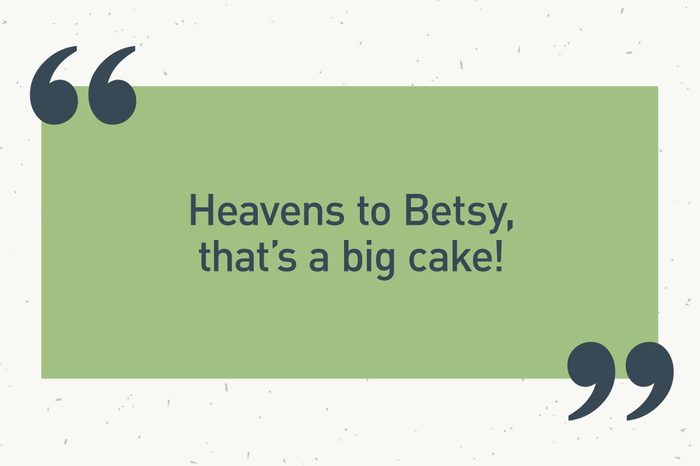
It’s not Ms. Ross
Another exclamation made the list—this time it’s “heavens to Betsy.” Like the ones we mentioned before, this one is used to express surprise and its origins are unclear. In other words, we’re still not sure who Betsy is. According to the Oxford English Dictionary, the first written mention was in 1914, but the expression has likely been around much longer than that. Others theorize that Betsy is in fact Betsy Ross, the woman best known for sewing the first American flag during the Revolutionary War. While that’s a decent guess, no one has been able to substantiate the claims. Not to mention that no one is ever certain Ross really did sew the first flag.

Try saying this three times fast
When something is not right, we want people to know it. In parts of the South, if something is askew or crooked you could say that it’s “cattywampus,” also spelled “catawampus.” It can also be used in place of the phrase “kitty-corner.” Though no one is sure of the word’s specific origins, we do know that it has been around for more than a century and may have derived from the Scots word “wampish,” meaning to “wriggle,” “twist” or “swerve.”

A damp donkey
Someone with significant wealth could be referred to as having “enough money to burn a wet mule.” But how much money is that, exactly? While there are no official figures, we do know where the expression originated. Back in 1929, Huey Long, governor of Louisiana at the time, tried to enact a five-cent tax on each barrel of refined oil produced. Naturally, Standard Oil didn’t like this, and the corporation tried to use its political clout to get him removed from office. Long went on the defensive, saying that Standard Oil had offered legislators as much as $25,000 to vote to remove him from office, or, as he put it enough money “to burn a wet mule.” There’s no word on whether or not any mules were harmed during the making of that expression.

Three sheets to the wind
A person who has had a lot to drink may be described as being “as drunk as Cooter Brown” in parts of the South. As legend has it, Cooter Brown lived on the border of the North and South just ahead of the Civil War. Unwilling to fight, to avoid being drafted by either side, he supposedly stayed constantly intoxicated so neither side would want him. Whether Brown was real or part of Southern folklore, his name has been associated with drunkenness for more than a century. These quotes about drinking are so hilarious, they may make you spit your cocktail out.
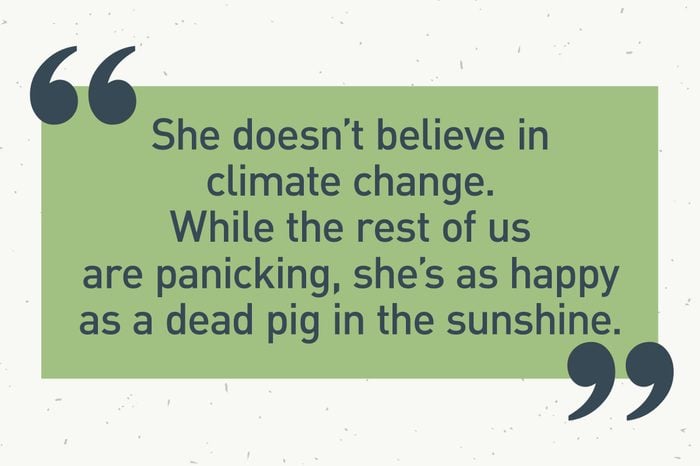
That’s quite a tan
When someone is blissfully ignorant of reality, Southerners may say that they’re “as happy as a dead pig in the sunshine.” Yes, this sounds morbid—and it is—but it does make sense. According to one explanation, when a pig dies outdoors the sun dries out their skin. As a result, the drying pulls the pig’s lips back making it look like it is smiling, even though it is dead. So when a person is “as happy as a dead pig in the sunshine,” it means that they aren’t in touch with reality and are happy as a result. These are the 10 most annoying phrases in the English language.
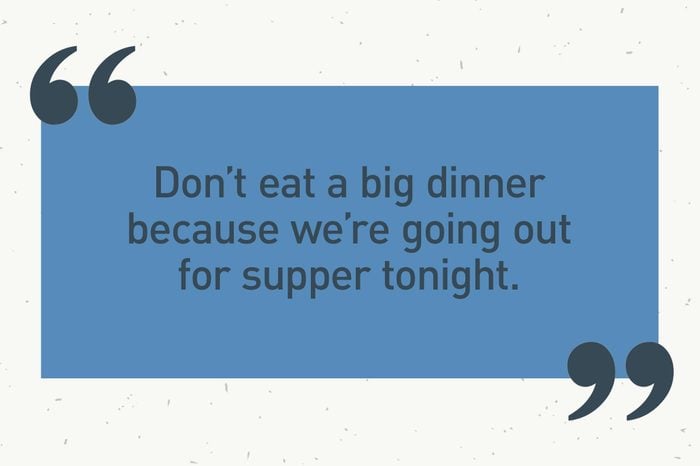
What about breakfast?
While some areas use the words “supper” and “dinner” interchangeably, that’s not the case in the South. According to Moseman, “dinner” refers to the midday meal—typically known elsewhere as “lunch.” And in the South, “supper” is the evening meal that non-Southerners would call “dinner.”
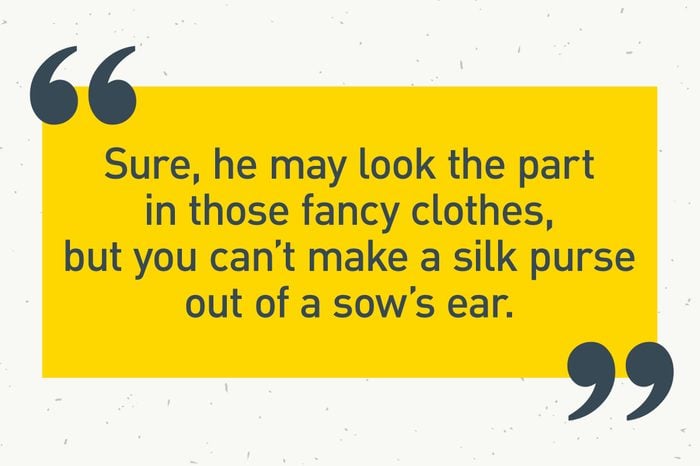
Like putting lipstick on a pig
As hard as people try to make something look nicer than it is, there have always been ways to call them out. One such way in the South is to say that “you can’t make a silk purse out of a sow’s ear.” The expression has been around since at least the 1500s and originally served as a proverb explaining that you can’t take something useless and inferior and turn it into something attractive and valuable.
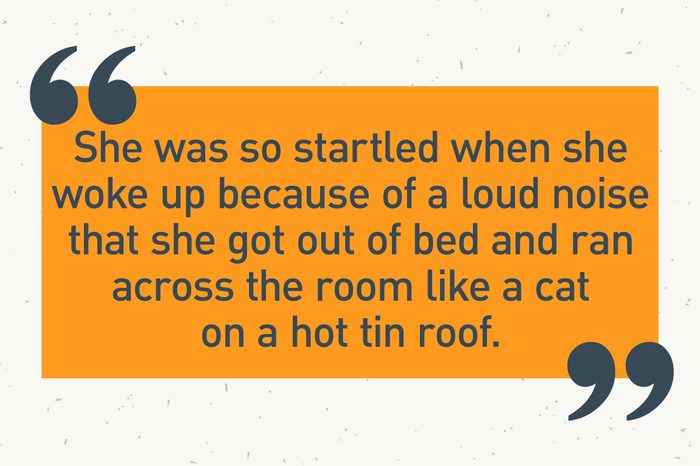
A frightened feline
Aside from being the title of a Tennessee Williams play, describing someone as being “like a cat on a hot tin roof” is also a Southern phrase meaning that the person is especially agitated and jumpy. According to one theory, the expression refers to the fact that cats aren’t fans of uncertain ground, so if they were on a hot tin roof they would be even more skittish than normal because of the slope of the roof as well as the high temperature. Find out the origins of 14 commonly used phrases.

Over the river and through the woods
If you’re pretty sure that you’ll be able to make it somewhere and only wouldn’t go in the event that something major happened, you could say that you’ll be there “if the creek don’t rise.” According to Southern Living, “unlike the United States Postal Service, whose motto proclaims ‘Neither snow nor rain nor heat nor gloom of night’ will keep them from their routes, sometimes a Southern visit is thwarted by a rising creek or other unexpected bump in the road.”

When you mean business
In the South, if you’d like to intensify a description you could add the phrase “as all get-out” to the end of the sentence. The expression “get-out”—also spelled getout—has colloquially meant “figuratively indicating a high degree of something” since at least 1838. For example, if you’re exhausted, you could say that you’re “tired as all get-out.”
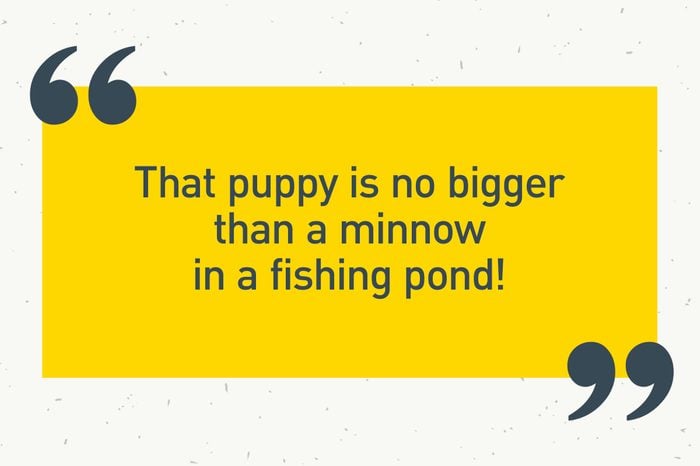
Go fish
Southerners have a great way to express that something is very small: “no bigger than a minnow in a fishing pond.” Southern Living explains it well: “When you arrive on the banks of the fishing pond on Saturday mornings, you’re hoping for a good catch—enough big catfish and bream to fry up for the family on Saturday night. If you find only minnows, though, they look even smaller compared to the heavy catch you hoped for. ‘No bigger than a minnow in a fishing pond’ is as tiny as can be.” Find out the origins of more of your favorite animal-related sayings.

Should have gone with the elastic waist
A person who thinks very highly of himself can be described in the South as being “too big for his britches.” The expression is approximately 200 years old and is thought to have originated in the United States. Essentially it means that someone’s ego has gotten so big that it can no longer be contained by their usual-sized pants.

When she’s got it, she’s got it
On the other hand, if you want to compliment a person you can say that they have “gumption,” which means they have courage, initiative, and spunk. According to Southern Living, the word originated in the 1700s in England and Scotland — where it meant “common sense”—before it was embraced and adapted by Southerners. By the 20th century, the word evolved to its current meaning.

Isn’t that a river?
Instead of saying “well, I swear” to express how you feel about something, another Southern option is to say “well, I Swanee.” Typically associated with the Appalachian Mountains of Southwest Virginia, the phrase has various spellings and is thought to have originated with the Old English term “I’ll swanny” which translates to “I shall warrant.”
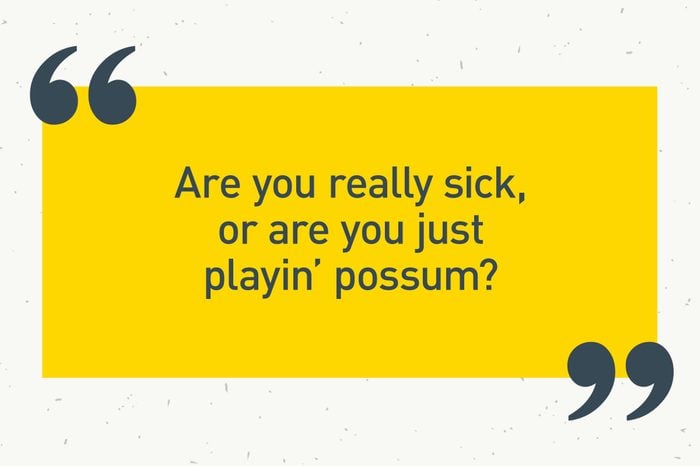
The fake-out
If a Southerner says that someone is “just playin’ possum” it means that they think the person is faking it. When a possum—as in the animal—feels as though it is in danger, it typically pretends to be dead in order to trick their predators. The first recorded use of the expression was in 1822 and it’s been around since.

The chicken’s dentures
To describe something that is incredibly unusual, a Southerner might say that it’s “as scarce as hen’s teeth.” This one is pretty straightforward: hens don’t have teeth, so if you happened to find one with teeth, it would be extremely rare. It first appeared in James Gilmore’s book My Southern Friends in 1863 and became a popular phrase during the Civil War.

Time to go to the dentist
If you say that someone “can eat corn through a picket fence,” it means that they have buck teeth—large enough to enable them to consume corn through the gaps of a picket fence. The origins of this expression are unknown, but it provides some vivid imagery. These 11 words and phrases used to be considered insults, but now they’re compliments.

Maybe it’s a sheepdog?
In the South, if someone suggests an idea that people know won’t work, someone else might comment, “that dog don’t hunt.” According to one theory, this expression originated in the South in the late 1800s and refers to the fact that dogs are frequently used to assist in hunting. But if a dog doesn’t hunt, that means it’s not working. These 30 slang words from the 1920s are worth bringing back.
“Making a snowman outside in July? That dog don’t hunt.”

Supermarket sweep
If you’re in the New Orleans area and someone asks you to “make groceries,” they aren’t requesting that you go into industrial food manufacturing—they want you to go grocery shopping. The expression “make groceries” is a translation of the French “faire son marché” (“to do one’s market shopping”). As it turns out, “faire” can mean both “do” and “make” so this is a case of it being translated one way and then catching on.

What are you in the mood for?
Someone who has a longing or craving for something may say that they have a “hankering” for it. Though the exact origin of the word is unknown, it dates back to the 1600s and likely derives from the Flemish word “hankeren,” related to the Dutch word “hunkeren” meaning “to hanker, to long for.”
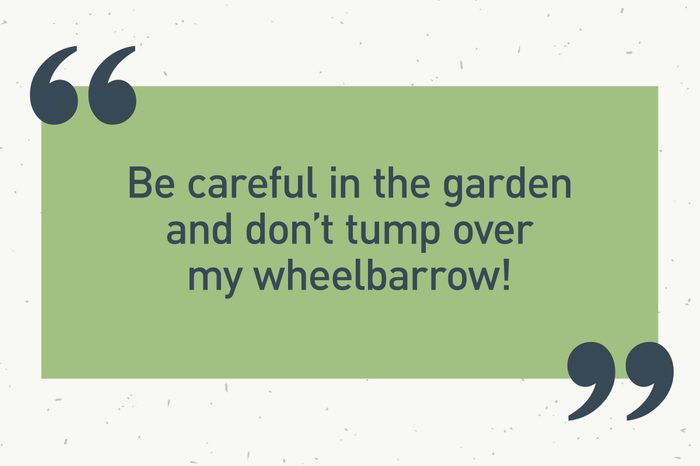
Not a typo
In parts of the South, the word “tump” can be used instead of “overturn.” A combination of the words “tip” and “dump,” American Heritage Dictionary identifies it as being a uniquely Southern term. Though we don’t know the exact origin, it was thought to have been first recorded at some point between 1580 and 1590, and may be related to the British word “tumpoke” which means “to fall head-over-heels.”

Like a snake
A person having a temper tantrum can also be described as having a “hissy fit.” The expression is thought to have originated in the early 1900s, but there’s disagreement as to what exactly it means. Some think it started off as a version of “hysterical,” while others say it refers to the hissing sound someone might make when they’re agitated.

Get. Out.
Looking to get rid of someone? There’s a Southern expression for that, and that would be “Don’t let the door hit you where the good Lord split you.” Moseman says this can be used in place of “Don’t let the door hit you on the way out” or “get lost!” According to Geneva Smitherman’s book Talkin and Testifyin: The Language of Black America, the phrase is African American slang that is a “nasty command to leave, euphemism of ‘split you’ avoiding profanity.” Find out the slang words no one outside your state will understand.

So so
If someone asks you how something is going and it’s not terrible, but also not amazing, you could say that it’s “fair to middling.” The expression dates back to the early 1800s, and the word “middling” is an old Scots word in use since at least the 15th century. It had the same meaning as it does today: “of medium or moderate size, strength, quality.” Next, read on to find out the origins of your favorite slang words.
